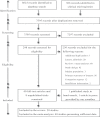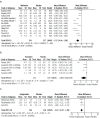Pharmacological strategies to counteract antipsychotic-induced weight gain and metabolic adverse effects in schizophrenia: a systematic review and meta-analysis
- PMID: 24636967
- PMCID: PMC4193713
- DOI: 10.1093/schbul/sbu030
Pharmacological strategies to counteract antipsychotic-induced weight gain and metabolic adverse effects in schizophrenia: a systematic review and meta-analysis
Abstract
Background: Antipsychotic-induced metabolic adversities are often difficult to manage. Using concomitant medications to counteract these adversities may be a rational option.
Objective: To systematically determine the effectiveness of medications to counteract antipsychotic-induced metabolic adversities in patients with schizophrenia.
Data sources: Published articles until November 2013 were searched using 5 electronic databases. Clinical trial registries were searched for unpublished trials.
Study selection: Double-blind randomized placebo-controlled trials focusing on patients with schizophrenia were included if they evaluated the effects of concomitant medications on antipsychotic-induced metabolic adversities as a primary outcome.
Data extraction: Variables relating to participants, interventions, comparisons, outcomes, and study design were extracted. The primary outcome was change in body weight. Secondary outcomes included clinically relevant weight change, fasting glucose, hemoglobin A1c, fasting insulin, insulin resistance, cholesterol, and triglycerides.
Data synthesis: Forty trials representing 19 unique interventions were included in this meta-analysis. Metformin was the most extensively studied drug in regard to body weight, the mean difference amounting to -3.17 kg (95% CI: -4.44 to -1.90 kg) compared to placebo. Pooled effects for topiramate, sibutramine, aripiprazole, and reboxetine were also different from placebo. Furthermore, metformin and rosiglitazone improved insulin resistance, while aripiprazole, metformin, and sibutramine decreased blood lipids.
Conclusion: When nonpharmacological strategies alone are insufficient, and switching antipsychotics to relatively weight-neutral agents is not feasible, the literature supports the use of concomitant metformin as first choice among pharmacological interventions to counteract antipsychotic-induced weight gain and other metabolic adversities in schizophrenia.
Keywords: PRISMA; antipsychotic; concomitant; meta-analysis; metabolic; schizophrenia.
© The Author 2014. Published by Oxford University Press on behalf of the Maryland Psychiatric Research Center. All rights reserved. For permissions, please email: journals.permissions@oup.com.
Figures


Comment in
-
Metformin to reduce weight gain and metabolic disturbance in schizophrenia.Evid Based Ment Health. 2015 Aug;18(3):89. doi: 10.1136/eb-2014-102039. Epub 2015 Jun 16. Evid Based Ment Health. 2015. PMID: 26081916 Free PMC article. No abstract available.
References
-
- Poyurovsky M, Fuchs C, Pashinian A, Levi A, Weizman R, Weizman A. Reducing antipsychotic-induced weight gain in schizophrenia: a double-blind placebo-controlled study of reboxetine-betahistine combination. Psychopharmacology (Berl). 2013;226:615–622 - PubMed
-
- Ghanizadeh A, Nikseresht MS, Sahraian A. The effect of zonisamide on antipsychotic-associated weight gain in patients with schizophrenia: a randomized, double-blind, placebo-controlled clinical trial. Schizophr Res. 2013;147:110–115 - PubMed
Publication types
MeSH terms
Substances
LinkOut - more resources
Full Text Sources
Other Literature Sources
Medical

